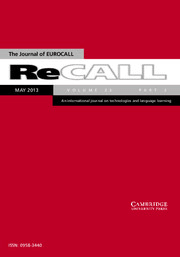
ReCALL
Scope & Guideline
Pioneering Insights in Computer-Assisted Language Learning
Introduction
Aims and Scopes
- Computer-Assisted Language Learning (CALL):
The journal consistently emphasizes research on CALL, exploring various tools and technologies that facilitate language learning, including software, applications, and online platforms. - Innovative Pedagogical Approaches:
ReCALL publishes studies that investigate new teaching methodologies, such as task-based learning, game-enhanced learning, and immersive technologies, demonstrating their impact on language acquisition. - Teacher Education and Professional Development:
The journal highlights research on preparing language teachers for the integration of technology in their teaching practices, focusing on professional development and pedagogical knowledge. - Learner-Centered Research:
Research that considers learner experiences, preferences, and outcomes in language learning contexts is a core focus, emphasizing the importance of learner engagement and agency. - Data-Driven Learning and Assessment:
The journal includes studies on data-driven learning approaches and assessments, examining how analytics and learner data can inform teaching and improve language learning outcomes.
Trending and Emerging
- Artificial Intelligence in Language Learning:
There is a growing focus on the use of AI tools, such as chatbots and automated feedback systems, to enhance language learning experiences, indicating a trend towards personalized and adaptive learning environments. - Virtual and Augmented Reality Applications:
Research exploring the use of virtual and augmented reality technologies in language education is on the rise, highlighting their potential for immersive learning experiences that reduce anxiety and enhance engagement. - Data-Driven Decision Making:
An increasing number of studies utilize learning analytics and big data to inform teaching practices and improve learner outcomes, reflecting a trend towards evidence-based approaches in language education. - Collaborative and Interactive Learning Environments:
There is a notable increase in research on collaborative learning through technology, including virtual exchanges and online communities, emphasizing social interaction as a key component of language acquisition. - Multimodal Learning Approaches:
The integration of various modes of communication, including video, audio, and interactive elements, is becoming more prevalent, indicating a shift towards multimodal strategies that cater to diverse learner needs.
Declining or Waning
- Traditional Language Learning Methods:
There is a noticeable decline in research focused on conventional language teaching methods that do not incorporate technology. As digital tools become more prevalent, traditional approaches are being overshadowed. - Static Text-Based Learning:
Research centered solely on static, text-based learning materials is less prominent, as studies increasingly favor interactive and multimedia approaches that engage learners more effectively. - Narrow Focus on Specific Language Skills:
Papers that exclusively target isolated language skills (e.g., grammar drills) are less common, with a shift towards integrated skill development and holistic approaches in language learning. - Limited Contextual Research:
There is a decrease in studies that examine language learning in highly specific or localized contexts without broader applicability, as researchers seek to address more universal themes and trends. - Replicative Studies with Minimal Innovation:
While replication remains valuable, there is a waning interest in studies that replicate existing research without introducing novel insights or variations, as the field moves towards innovation and new methodologies.
Similar Journals
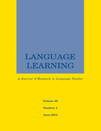
LANGUAGE LEARNING
Charting new territories in language acquisition.LANGUAGE LEARNING is a premier academic journal dedicated to advancing the field of language acquisition and education, published by Wiley. With a foundation dating back to 1948, the journal has carved an esteemed niche in the academic landscape, currently holding a prestigious Q1 rank in both the categories of Education and Linguistics and Language. It proudly occupies the 9th percentile rank in the Arts and Humanities domain and the 10th percentile in Social Sciences, illustrating its influence and reach. The journal publishes high-quality research that explores various dimensions of language learning, from cognitive processes to pedagogical approaches, making it an essential resource for researchers, educators, and students alike. Although Access options are non-open, the journal remains accessible to a wide audience, reinforcing its commitment to disseminating critical insights within the academic community.
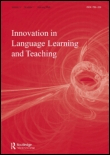
Innovation in Language Learning and Teaching
Fostering Excellence in Language Learning through Innovation.Innovation in Language Learning and Teaching is a premier peer-reviewed journal published by Routledge Journals, Taylor & Francis Ltd, focusing on the intersection of innovative practices in language education and teaching methodologies. With a notable impact factor reflected in its recent placement in the Q1 quartile for both Education and Linguistics and Language categories, this journal serves as a crucial resource for scholars and practitioners aiming to enhance pedagogical approaches and improve learning outcomes in language education. Spanning from 2009 to 2024, it showcases cutting-edge research that addresses contemporary challenges in the field, facilitating a deeper understanding of language acquisition, pedagogy, and curriculum development. The journal is indexed in Scopus, demonstrating its significant contribution to the academic community, with impressive ranks in both the Arts and Humanities as well as the Social Sciences categories. Although it follows a traditional subscription model, the journal is committed to disseminating high-quality research that fosters collaboration and discussion among researchers, educators, and students dedicated to advancing language learning and teaching practices.

Journal of Language Teaching and Learning
Enhancing Global Communication Through Language LearningJournal of Language Teaching and Learning, with ISSN 2146-1732, is a pivotal peer-reviewed publication dedicated to advancing the fields of language education and linguistics. Published by JOURNAL LANGUAGE TEACHING & LEARNING in Ankara, Turkiye, this journal aims to disseminate cutting-edge research, innovative teaching strategies, and critical analyses that serve the diverse needs of language teachers and learners globally. As an open-access journal, it is committed to providing unrestricted access to high-quality research, making it an invaluable resource for researchers, educators, and students alike. With a strong focus on promoting effective language acquisition and pedagogical practices, the Journal of Language Teaching and Learning holds an important space in the academic landscape, encouraging scholarly dialogue and collaboration in the pursuit of linguistic excellence.

FOREIGN LANGUAGE ANNALS
Connecting Cultures Through Language StudiesForeign Language Annals is a prestigious academic journal published by Wiley, dedicated to advancing the field of linguistics and language studies. Since its inception in 1967, the journal has established itself as a vital resource for researchers, professionals, and students interested in the evolving dynamics of foreign language education and acquisition. With an impressive impact factor that places it in the Q1 category for Linguistics and Language in 2023, Foreign Language Annals ranks 48th out of 1167 journals in its domain, showcasing its influence and reach within the scientific community. Through a diverse range of scholarly articles and research findings, the journal aims to foster innovation and best practices in language instruction and pedagogy. Although not open access, it remains accessible to a broad readership, offering invaluable insights for those striving to improve language education and understanding across cultures.

Porta Linguarum
Innovating language studies to enhance pedagogical practices.Porta Linguarum, published by UNIV GRANADA in Spain, is a pioneering journal dedicated to the fields of linguistics and language studies, with a dual focus on the educational implications and applications within these disciplines. Launched in 2008 and continuing its impactful contributions into 2024, the journal is recognized for its rigorous peer-reviewed articles that address contemporary language issues, pedagogical approaches, and linguistic research, evidenced by its notable rankings in the 2023 Scopus metrics. Porta Linguarum holds a distinguished Q1 classification in Linguistics and Language, alongside a respectable Q3 placement in Education, marking it as a valuable resource for academics and practitioners alike. With an impressive ranking of 231 out of 1088 in the Arts and Humanities category and a strong 78th percentile ranking for Language and Linguistics, this journal facilitates the exchange of innovative ideas and promotes scholarly discourse. Although currently not adopting an open access model, it remains an essential platform for advancing knowledge in linguistics and education.

Journal of Asia TEFL
Illuminating the Future of English Teaching in AsiaWelcome to the Journal of Asia TEFL, a leading peer-reviewed platform dedicated to exploring the intersections of English language education, linguistics, and the dynamic educational landscapes of Asian contexts. Published by ASIA TEFL in South Korea, this journal has emerged as a pivotal resource for academia since its inception in 2004, with consistently expanding influence reflected in its Scopus rankings, including a notable 76th percentile in Linguistics and Language. With a focus on the evolving methodologies and pedagogical innovations in English language teaching, the journal aims to foster scholarly discussions that enhance teaching practices and policy-making in a globalized world. Although it currently operates without open access, its rigor and relevance in categories such as Education and Linguistics ensure that it remains a valuable asset for researchers, educators, and students seeking to advance their knowledge and practice within this vital field of study.
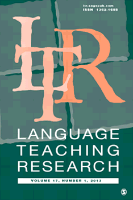
Language Teaching Research
Pioneering research for effective language teaching.Language Teaching Research, published by SAGE Publications Ltd, serves as a pivotal platform for scholars and practitioners in the domains of education and linguistics. Since its inception in 1997, this prestigious journal has maintained its status within the Q1 category for both Education and Linguistics, symbolizing its significant impact and commitment to excellence in research. With impressive Scopus rankings placing it among the top percentile in its fields, Language Teaching Research provides a comprehensive array of articles, studies, and reviews dedicated to advancing the theory and practice of language education. Although currently not an Open Access journal, it remains essential reading for those engaged in the evolving challenges and methodologies surrounding language teaching and learning. The journal aims to foster insightful discussions and disseminate innovative research findings, making it a crucial resource for educators, researchers, and students keen on enhancing language acquisition and pedagogical strategies.
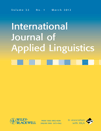
International Journal of Applied Linguistics
Pioneering Research for Language Educators and PractitionersInternational Journal of Applied Linguistics, published by WILEY, is a premier platform for cutting-edge research in the field of applied linguistics. With a notable Impact Factor and ranked in the top Q1 quartile of linguistics and language, this journal serves as an essential resource for scholars, practitioners, and students. The journal’s wide-ranging scope includes various subfields such as language acquisition, language education, sociolinguistics, and discourse analysis, fostering multidisciplinary approaches to language studies. It has achieved a significant Scopus Rank, placing it in the 90th percentile for both Arts and Humanities as well as Social Sciences categories, reflecting its high visibility and influence in the academic community. The International Journal of Applied Linguistics is committed to advancing the understanding of language use in real-world contexts through rigorously peer-reviewed articles that contribute to both theory and practical applications. While it is not an open-access journal, it remains a highly respected publication for researchers looking to disseminate and acquire knowledge in applied linguistics.

Malaysian Journal of ELT Research
Shaping the Future of English Language Teaching TogetherMalaysian Journal of ELT Research is a pioneering platform dedicated to advancing the field of English Language Teaching (ELT) research, published by the Malaysian English Language Teaching Association. With an ISSN of 1511-8002, this journal serves as a vital resource for educators, researchers, and practitioners who are passionate about enhancing English language instruction in Malaysia and beyond. Although specific impact factors are currently not available, the journal's commitment to quality research is evident in its rigorous peer-review process, fostering innovative studies that address contemporary challenges in ELT. The journal embraces a wide range of topics within English language pedagogy, including but not limited to curriculum development, teaching methodologies, and language assessment. It provides an open-access model, ensuring that valuable research insights are readily accessible to a global audience. With its strategic focus on enriching English language education, the Malaysian Journal of ELT Research stands as an important contributor to scholarly discourse in the realm of language teaching and learning.
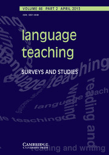
Language Teaching
Exploring the future of language pedagogy and applied linguistics.Language Teaching, published by Cambridge University Press, is a premier peer-reviewed journal that has been at the forefront of the linguistics and language education field since its inception in 1969. With an impressive impact factor positioning it in the top tier (Q1) of its category, this journal is ranked 22nd among 1,088 in the Arts and Humanities field and maintains an outstanding 98th percentile ranking. Focusing on innovative research and methodologies in language teaching and learning, Language Teaching provides a vital platform for discussing the latest developments in pedagogy, applied linguistics, and curriculum design. Although it does not offer open access options, it reaches a broad audience of researchers, educators, and practitioners dedicated to enhancing language instruction across various contexts. The journal continues to evolve, with plans to cover emerging trends and challenges in language education until 2024, making it an essential resource for anyone invested in the teaching of languages.